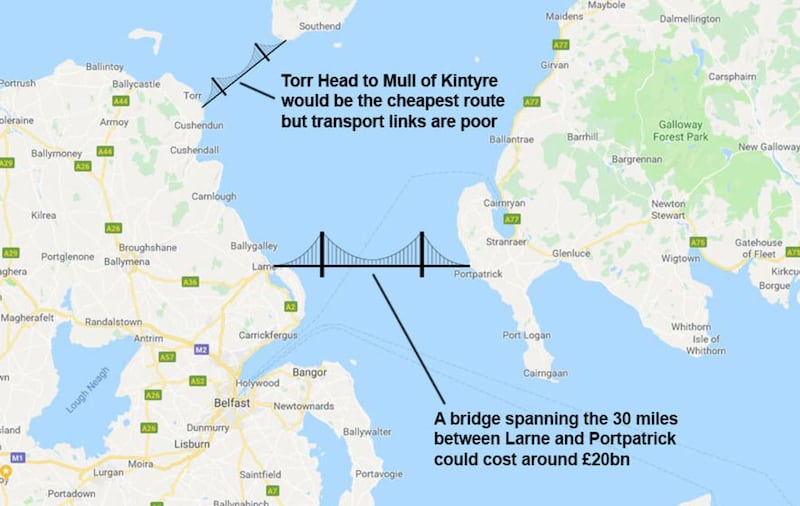British Transport Secretary Grant Shapps said that any fixed link between Scotland and Northern Ireland is more likely to be a tunnel than a bridge.
A major transport connectivity review is assessing the feasibility of a bridge or tunnel between Northern Ireland and Scotland.
The research is being carried out as part of British prime minister Boris Johnson’s bid to improve UK transport links.
In the House of Commons SDLP leader Colum Eastwood challenged Mr Johnson over proposals to build a bridge between Northern Ireland and Scotland.
He told the Commons: "The prime minister's fantasy bridge to Northern Ireland could cost £33 billion. This while our road and rail networks have been absolutely decimated from decades of underinvestment.
"The Conservative Party did a grand total of 2,399 at the last assembly election, what mandate does he think he has to override the democratically elected people of Northern Ireland to impose a bridge that goes through miles of unexploded munitions and radioactive waste?"
Mr Johnson responded: "Actually, if (Mr Eastwood) read the article I wrote this morning in the Daily Telegraph, he will have seen that the things that we've set out in the Hendy review I think will be of massive benefit to Northern Ireland, including upgrading the A75 which is the single biggest thing that people in Northern Ireland wanted by the way and which the Scottish nationalists, Scottish National Party, have totally to do.
"As well as better connections East-West within Northern Ireland, which we should be doing as well, as well as better connections North-South within the island of Ireland.
"It's a fantastic union connectivity review, he should appreciate it, it's the way forward and I'm amazed frankly at his negativity."
Mr Shapps told BBC Radio 4’s Today programme: “I imagine that you would need to do a tunnel because of weather factors.”
He added: “What we are talking about here is bridging or tunnelling a distance from here to France where notably we have built a tunnel.
“I don’t think it should be controversial that it would a good idea to make sure all parts of the United Kingdom are connected together as easily as possible.”
Mr Shapps rejected a claim by Scottish First Minister Nicola Sturgeon that money could be better spent than on building a link between Scotland and Northern Ireland.
Mr Shapps told the BBC: “I understand that it is not the responsibility of the Scottish First Minister to connect the United Kingdom together. The Scottish First Minister doesn’t even believe we should be in a United Kingdom. So I understand her perspective but I think it is wrong.
“For example, if you live in Northern Ireland, you want to know that you can reliably get the hauliers and lorry drivers in with goods from the mainland of the British Isles.
“Why would you ever be against connecting different parts of our country in a better way? It shouldn’t be a controversial thought at all.
“As one small part of this Union connectivity review (we will) undertake a study of the feasibility of doing that and we will report back in the summer.”

Network Rail chairman Sir Peter Hendy, who is carrying out a review of union connectivity, said further work is required on the possibility of a “fixed link” across the Irish Sea.
Following publication of his interim report, the British government announced that air passenger duty – a tax on passenger flights from UK airports – could be cut for domestic journeys.
Some £20 million has also been committed to develop plans for upgraded rail, road, sea and air links – and explore new requirements to offset emissions and decarbonise aviation.
Sir Peter has commissioned two engineering professors to lead a study into the feasibility of a bridge or tunnel between Northern Ireland and Scotland, outlining its cost, timescale and the work involved.
They are ex-HS2 and Crossrail chairman Douglas Oakervee and former vice-president of Jacobs Engineering Gordon Masterton.
Mr Johnson has repeatedly spoken about the prospect of a bridge, even though experts have warned that the depth of the Irish Sea and the presence of dumped munitions would cause problems.
The scheme could cost a reported £20 billion, although Mr Johnson has previously said it would “only cost about £15 billion”.
Scottish transport seccretary Michael Matheson said plans for a bridge are not a priority for ministers in Edinburgh or Belfast and branded the idea "nothing more than a vanity project" for Boris Johnson.
He said the Scottish government already has its own "robust process" for considering future transport infrastructure projects, and he claimed Westminster's Union Connectivity Review is "a systematic attack on the Scottish parliament's powers - a power-grab that fundamentally undermines devolution".
Mr Matheson told BBC Radio Scotland's Good Morning Scotland programme: "It's not a priority for Scotland, nor for Northern Ireland. I've just discussed the matter with Nichola Mallon, who is the minister for infrastructure in Northern Ireland last night, and she reiterated the point it is not a priority for Northern Ireland.
"It's in my interest to have good transport connectivity with other parts of the UK. But it has to be taken forward in a planned, managed basis, recognising the distinctive nature of the decision-making process in Scotland, as it is in England, Wales and Northern Ireland, rather than it being dictated by ministers in London, who are very remote from our communities and don't understand the nature of those communities."
Mr Matheson also discussed the proposed link when he appeared at the Scottish Parliament's Rural Economy and Connectivity Committee later on Wednesday.
He said the cost could be up to £50 billion, which would "suck financial resources away" from other transport infrastructure projects and the wider economy.
He told MSPs on the committee: "The bridge or tunnel is nothing more than a vanity project and I'll say again, it won't happen in my lifetime and I suspect it won't happen in the lifetime of anyone in this committee."
The distance from Larne to Portpatrick, one of the most likely routes for a bridge, is around 28 miles (45km).
There is no problem with distance, money or the Beaufort’s Dyke explosives disposal area, according to Mr Johnson.
In November 2018, he said: “The problem is not the undersea Beaufort’s Dyke or lack of funds. The problem is an absence of political will.”
Sir Peter’s interim report assessed ways transport can better connect all parts of the UK.
It set out how a UK Strategic Transport Network would deliver the ambition – upgrading direct transport links, reducing delays and stimulating growth across the four nations.
The Government’s £20 million will be spent on exploring the development of projects including improved rail connectivity between the north coast of Wales and England; upgrading the A75 between Gretna, Dumfries and Stranraer; faster rail links from England to Scotland; and rail improvements in south-east Wales.
Mr Johnson said: “It’s now time to build back better in a way which brings every corner of the UK closer together.
“We will harness the incredible power of infrastructure to level up parts of our country that have too long been left off the transport map.
“This pioneering review by Sir Peter Hendy gives us the tools we need to deliver on our ambitions for a UK-wide transport network that encompasses sea, rail, and road – and I also want to cut passenger duty on domestic flights so we can support connectivity across the country.”








